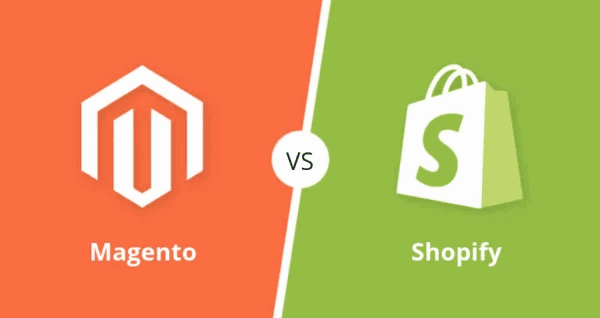Magento vs. Shopify A Detailed Comparison for 2024
In the realm of e-commerce platforms, Magento and Shopify stand out as two major players, each offering unique features and capabilities tailored to different business needs. This detailed blog post will delve into the comparison between Magento and Shopify, providing insights into their key differences, strengths, and weaknesses based on relevant statistics and expert analysis.

When establishing an online store, selecting the right e-commerce platform is crucial for the success of your business. Magento and Shopify are among the most popular choices, catering to a wide range of businesses from small enterprises to large corporations. Understanding the nuances of each platform is essential to make an informed decision that aligns with your specific requirements.
Platform Overview
- Magento: Known for its extensive feature set and customization options, Magento is favored by enterprise-scale businesses seeking total creative freedom in their online stores.
- Shopify: A user-friendly platform offering a wide array of built-in features, add-ons, and customization options, Shopify is ideal for quick store setup and management, especially for small to midsize enterprises.
Market Share and Adoption
- As of January 2024, Magento is utilized by over 239,000 shops globally, showcasing its popularity among businesses requiring advanced customization and scalability5.
- In comparison, Shopify boasts over 3.6 million active e-commerce stores, indicating its widespread adoption and appeal to a broad spectrum of businesses2.
Features and Customization
- Magento: Offers unparalleled customization options, making it suitable for businesses with specific and advanced needs that require a high level of control over their online stores4.
- Shopify: Provides a user-friendly interface with easy-to-use features and built-in tools, making it ideal for beginners and small businesses looking for a hassle-free setup and management2.
Performance and Conversion Rates
- Magento: Known for its robust performance, Magento stores tend to have a higher average order value, making them ideal for businesses focused on maximizing revenue per visit3.
- Shopify: Excels in converting visitors into customers, with a higher average conversion rate and efficient checkout process, making it a preferred choice for businesses aiming to enhance conversion rates3.
Support and Maintenance
- Magento: Offers dedicated support for users of the Magento Commerce plan, providing technical assistance, security updates, and other features to ensure smooth operation4.
- Shopify: Provides round-the-clock support for all plans, with additional services for Shopify Plus users, ensuring easy access to professional help and resources
Which platform is more suitable for small businesses
Based on the search results, Shopify is generally considered more suitable for small businesses due to its user-friendly interface, ease of setup, and lower technical requirements. Some key points that support this conclusion are:
-
Ease of Use: Shopify is designed to be user-friendly, with a simpler interface that is easier to set up and manage using modules1.
-
Scalability: Shopify offers scalability, making it suitable for small businesses that plan to expand in the future1.
-
Integration with Third-Party Apps: Shopify has a rich app store that allows businesses to add functionality as their needs evolve2.
-
Customer Support: Shopify offers round-the-clock support for all plans, reducing the burden of maintenance and ensuring easy access to professional help1.
-
Ease of Installation and Management: Shopify is known for its ease of installation and management, making it a good choice for businesses that do not have special skills2. On the other hand, Magento is more suitable for larger businesses due to its extensive customization options and advanced features. Some key points that support this conclusion are:
-
Customization: Magento offers extensive customization options, making it suitable for businesses with specific and advanced needs.
-
Scalability: Magento provides excellent scalability, making it a solid choice if you plan to expand your business significantly in the future.
-
Advanced Features: Magento offers advanced features for e-commerce, including robust SEO capabilities, multi-store support, and extensive third-party integrations
What are the security features of Magento VS Shopify
Both Magento and Shopify offer robust security features to protect small businesses. Here’s a comparison of their security features:
Magento:
- Security Updates: Magento regularly releases security updates and patches to ensure the platform remains secure.
- SSL Certificates: Magento supports SSL certificates, which encrypt data transmitted between the store and customers, protecting sensitive information.
- PCI Compliance: Magento is PCI compliant, ensuring that customer data is secure during transactions.
- Customizable Security: Magento allows for customizable security settings, allowing businesses to tailor their security to their specific needs.
- Multi-factor Authentication: Magento supports multi-factor authentication, adding an extra layer of security to user accounts.
Shopify:
- Secure Hosting: Shopify hosts all stores on its servers, ensuring that they are secure and up-to-date.
- SSL Certificates: Shopify includes SSL certificates for all stores, encrypting data transmitted between the store and customers.
- PCI Compliance: Shopify is PCI compliant, ensuring that customer data is secure during transactions.
- Automatic Updates: Shopify automatically updates its platform and themes, ensuring that stores remain secure and up-to-date.
- 24/7 Monitoring: Shopify monitors its platform for potential security threats and vulnerabilities, ensuring that stores remain secure
End Note
In conclusion, the choice between Magento and Shopify depends on your business goals, budget, and technical requirements. While Magento offers extensive customization and control, Shopify excels in user-friendliness and quick setup. Understanding the unique strengths of each platform is essential to make an informed decision that aligns with your e-commerce objectives. By considering the insights provided in this blog post, you can navigate the Magento vs. Shopify dilemma with confidence, selecting the platform that best suits your business needs and sets the stage for online success
